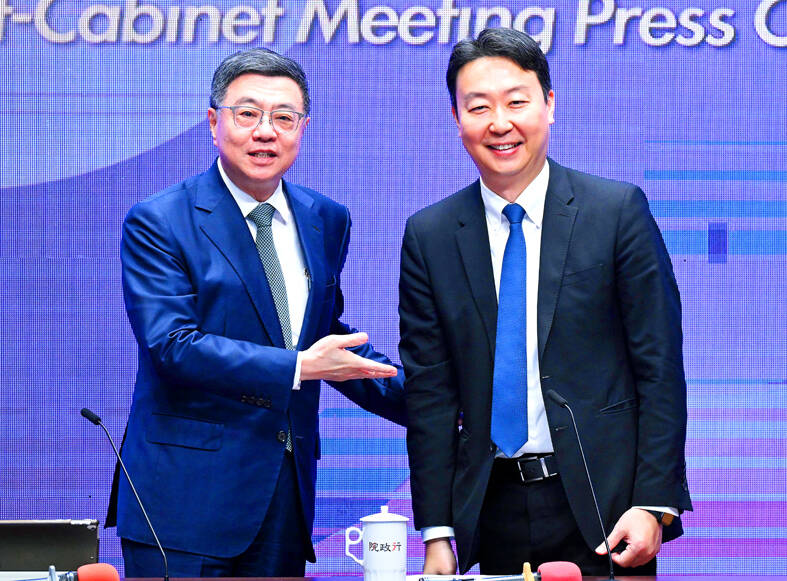Executive Yuan spokesman Chen Shih-kai (陳世凱) is to be the nation’s new minister of transportation and communications, Premier Cho Jung-tai (卓榮泰) announced yesterday.
Chen is to succeed former transport minister Li Meng-yen (李孟諺), who resigned on Tuesday last week after his decade-long extramarital affair was revealed on an online forum.
“Chen followed government officials in inspecting infrastructure damage caused by a magnitude 7.2 earthquake that struck off Hualien on April 3 and Typhoon Gaemi earlier this month. He knows the challenges the new government faces,” Cho told a news conference after the weekly Cabinet meeting.

Photo: Liao Chen-huei, Taipei Times
“We have observed how Chen worked and his ability to quickly grasp the fundamental questions in various issues. President William Lai (賴清德) and I think that Chen can handle the job,” Cho added.
Having served as Taichung city councilor for many years, Chen is also well-informed about the problems with local transportation systems, Cho said.
“I am confident his expertise in politics and corporate management also prepares him to select the right people for different tasks, run the transportation ministry efficiently and take the ministry forward,” he said.
Chen is scheduled to take office on Monday next week.
Julia Hsieh (謝子涵), who serves as the Executive Yuan deputy spokesperson, is to temporarily serve as spokesperson.
Chen was appointed because of his grasp of government policies and his ability to communicate with the media and among government officials, a source familiar with the matter said.
He is a great communicator and is “able to translate policies that are often difficult to understand and convey them clearly to the public,” the source said. “He is also capable of communicating and coordinating among government agencies, and in so doing government policies can be implemented smoothly.”
The appointment of Chen, who does not have an academic background in transportation, shows that the new Cabinet seeks to introduce transportation policy reforms that make a difference to people’s lives, without being confined to the opinions of so-called “experts,” the source said.
During his time in Taichung, Chen asked the city government to plan ahead the transit system before the Taichung MRT system would be completed, including public bus and public bike services.
However, Chen’s appointment drew mixed reactions.
“The Cabinet would have to convince the public that Chen has the expertise and the ability to run the transportation ministry, which has an annual budget of about NT$60 billion [US$1.88 billion],” said Chinese Nationalist Party (KMT) Legislator Hung Meng-kai (洪孟楷), who previously served as convener of the legislature’s Transportation Committee.
Chen does not have transportation-related experience, National Drivers’ Alliance chairman Liu Hung-chang (劉鴻樟) said.
“There is a lot to learn about transportation, and Li and acting transportation minister Chen Yen-po (陳彥伯) could assume the post because they have accumulated significant administrative experience,” Liu said. “While I recognize that the Democratic Progressive Party is willing to groom young politicians for public office, I am not sure Chen is ready for such an important job and he might feel overwhelmed.”
Taiwan Vision Zero Alliance board director Lo Yi (羅宜) said that whoever serves as minister must be able to consolidate issues involved in policies and communicate with different interest groups.
“We welcome such an appointment so long as the new minister is willing to tackle transportation issues using people-oriented approaches. He should continue to communicate with driver’s rights and pedestrian rights groups before stipulating any new policy. We still have a long way to go in reducing casualties caused by traffic accidents,” Lo said.

Taiwanese can file complaints with the Tourism Administration to report travel agencies if their activities caused termination of a person’s citizenship, Mainland Affairs Council Minister Chiu Chui-cheng (邱垂正) said yesterday, after a podcaster highlighted a case in which a person’s citizenship was canceled for receiving a single-use Chinese passport to enter Russia. The council is aware of incidents in which people who signed up through Chinese travel agencies for tours of Russia were told they could obtain Russian visas and fast-track border clearance, Chiu told reporters on the sidelines of an event in Taipei. However, the travel agencies actually applied

Japanese footwear brand Onitsuka Tiger today issued a public apology and said it has suspended an employee amid allegations that the staff member discriminated against a Vietnamese customer at its Taipei 101 store. Posting on the social media platform Threads yesterday, a user said that an employee at the store said that “those shoes are very expensive” when her friend, who is a migrant worker from Vietnam, asked for assistance. The employee then ignored her until she asked again, to which she replied: "We don't have a size 37." The post had amassed nearly 26,000 likes and 916 comments as of this

New measures aimed at making Taiwan more attractive to foreign professionals came into effect this month, the National Development Council said yesterday. Among the changes, international students at Taiwanese universities would be able to work in Taiwan without a work permit in the two years after they graduate, explainer materials provided by the council said. In addition, foreign nationals who graduated from one of the world’s top 200 universities within the past five years can also apply for a two-year open work permit. Previously, those graduates would have needed to apply for a work permit using point-based criteria or have a Taiwanese company

The Shilin District Prosecutors’ Office yesterday indicted two Taiwanese and issued a wanted notice for Pete Liu (劉作虎), founder of Shenzhen-based smartphone manufacturer OnePlus Technology Co (萬普拉斯科技), for allegedly contravening the Act Governing Relations Between the People of the Taiwan Area and the Mainland Area (臺灣地區與大陸地區人民關係條例) by poaching 70 engineers in Taiwan. Liu allegedly traveled to Taiwan at the end of 2014 and met with a Taiwanese man surnamed Lin (林) to discuss establishing a mobile software research and development (R&D) team in Taiwan, prosecutors said. Without approval from the government, Lin, following Liu’s instructions, recruited more than 70 software